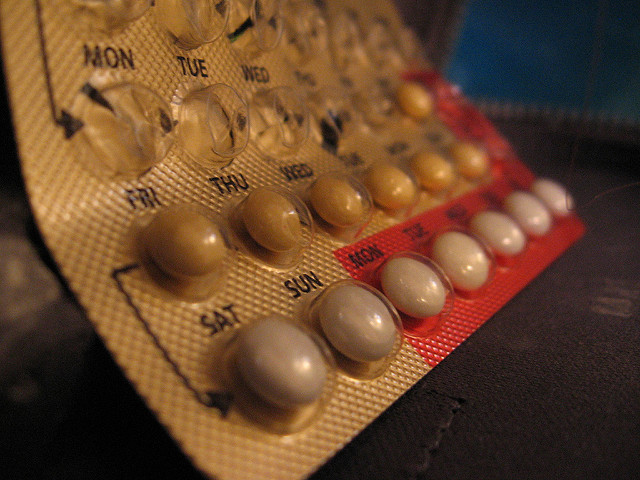A new study in Denmark, published in JAMA Psychiatry, investigates the effects of hormonal contraception on risk for developing depression and using antidepressant medication. The study was partially funded by the Lundbeck Foundation (Lundbeck is a pharmaceutical company that sells antidepressants). The results of the nationwide study, analyzing data from over one million women, suggest that hormonal contraceptive use may increase the risk of depression and use of antidepressants, especially for adolescents.
“Because hormonal contraception introduces synthetic hormones and modulates the internal hormone production, an examination of the influence of hormonal contraceptives on women’s mood is warranted,” write the researchers, led by Charlotte Wessel Skovlund a faculty member in the Department of Gynaecology at the University of Copenhagen.

Depression affects about twice as many women as men, but this gender difference does not begin to arise until after puberty. Researchers have speculated that estrogen and progesterone may be involved in developing symptoms of depression. There have been mixed findings from previous studies that investigated whether hormonal contraceptive use affects the risk of developing depression. Some studies found evidence to suggest that hormonal contraception increases risk, while others found it may be associated with elevated mood rather than depression symptoms, and one study found no association.
The authors name a major limitation in cross-sectional studies examining the effect of hormonal contraception on depressed mood: “Because mood symptoms are a known reason for cessation of hormonal contraceptive use, cross-sectional studies are vulnerable to healthy-user bias causing underestimation of a possible influence on depression.”
“To assess the influence of specific types of hormonal contraceptives on the risk for first use of antidepressants and first diagnosis of depression as an inpatient or an outpatient at a psychiatric hospital,” the researchers used data from the Danish Sex Hormone Register Study, which collects information from all women in Denmark.
The authors followed women who were between 15 and 34 years old from 1995 to 2013. They collected data from Denmark’s National Prescription Register and Psychiatric Central Research Register in order to gain information on hormonal contraception and antidepressant prescriptions, and first diagnosis of depression, respectively. The researchers used incidence rate ratios (RRs) to express the difference in incidence rates for women who used hormonal contraception compared to women who did not.
The authors found that 55.5% of women used hormonal contraception. They found that over 23,000 women were diagnosed with depression for the first time and over 133,000 antidepressant prescriptions were redeemed. The authors found statistically significant results, with women who used combined oral contraceptives (includes both estrogen and progesterone) having slightly higher incidence rates for first depression diagnosis (RR = 1.1) and first use of an antidepressant (RR = 1.2), compared to women who did not use any form of hormonal contraception.
The rates were even higher for women who used progesterone only contraceptives, lending evidence to the theory that progesterone has an impact on depressive symptoms. The authors also found that relative risk for first depression diagnosis (RR = 1.5) or first antidepressant use (RR = 1.4) was highest around six months after starting hormonal contraception.
The rates were even higher for women who used progesterone only contraceptives, lending evidence to the theory that progesterone has an impact on depressive symptoms. The authors also found that relative risk for first depression diagnosis (RR = 1.5) or first antidepressant use (RR = 1.4) was highest around six months after starting hormonal contraception.
The results for adolescents are the most striking, with the researchers stating, “Analyses restricted to adolescents (aged 15-19 years) showed notably higher RRs of first use of antidepressants and first diagnosis of depression. Compared with nonusers, users of combined oral contraceptives experienced a 1.8-fold higher rate (95% CI, 1.75-1.84) of first use of antidepressants.”
Given the common use of hormonal contraception and high rates of depression and antidepressant treatment, this study has significant findings for women who are considering or currently taking hormonal contraception, as well as for their providers. The findings may be most important for adolescent girls. The authors conclude, “Our data indicate that adolescent girls are more sensitive than older women to the influence of hormonal contraceptive use on the risk for first use of antidepressants or first diagnosis of depression.”
****
Skovlund C., Mørch L., Kessing L., Lidegaard Ø. (2016). Association of hormonal contraception with depression. JAMA Psychiatry. Advance online publication. doi:10.1001/jamapsychiatry.2016.2387 (Abstract)















Well this confirm,what academics know for decades.That only human hormones
are reason,for any so called mental illness.Biology won always,but my crazy kind
suffer and dying,because of rebellion against biology.And this is all,what Mental
Health system is about.Sadly no-one ever listen to primal maniacs,as I am.Those
who are aware and know,what is real reason for so called madness.It’s imbalance
of human hormones in my brains.Those who are against this,are either psychiatrists
or psychologists.Guilty one’s list,include entire neuroscience and endocrinology.
Medecine and Pharmacy,as hammer of maniacs.The dark era of science,can be
over,if people will stand against debunked lies of modern science.
Report comment
Hormonal contraception is a way to protect against unwanted pregnancy, which a woman can fully regulate independently. At the same time, its effectiveness is higher than all other protection options – while observing the rules of use, of course. Hormones are substances that actively affect all functions of the human body. Yes, in most cases they help to improve the quality of skin and hair, stabilize weight, etc. (You can read the full list of hormones in the human body here Wiki ). You must be very careful, artificially affecting the balance of hormones. You can influence and positively – rejuvenate the body, remove excess weight ( HRT benefits ), and achieve the opposite effect. (https://www.nhs.uk/conditions/hormone-replacement-therapy-hrt/risks/ )
Report comment